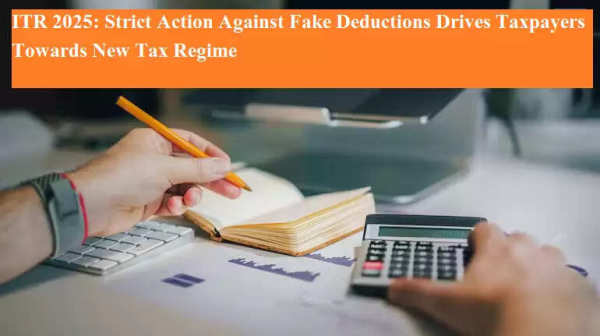
The Income Tax Department has ramped up surveillance on salaried taxpayers by leveraging Annual Information Statement (AIS) and Artificial Intelligence (AI) tools. The result? A significant behavioral shift is evident among taxpayers filing ITR for the Financial Year 2024–25—with growing preference for the new tax regime and increased caution in claiming deductions.
In recent years, the Income Tax Department has intensified scrutiny of fraudulent deduction claims, especially from salaried individuals. According to Vivek Jain, Partner at Tax Connect Advisory, this marks a stark departure from earlier leniency:
“Earlier, salaried individuals weren’t closely monitored. But now, there are clear signals that the department is taking strict action against fake claims. Taxpayers are only claiming deductions when they have valid supporting documents.”
AIS and AI tools are enabling the government to automatically track discrepancies between reported income and actual spending patterns. This data-driven ecosystem is creating a deterrent effect, encouraging clean and compliant filings.
Chartered Accountant Akhil Pachauri observed that inflated donations—especially to political parties—were common in previous years. However, such instances have declined significantly in FY 2024–25 due to fear of notices and raids.
To further tighten the noose, the I-T Department has added additional disclosure requirements in the ITR forms:
Section 80C (Investments like PPF, ELSS)
Section 80D (Health insurance premiums)
House Rent Allowance (HRA) claims
Taxpayers must now submit detailed documentation to support these claims, thereby curbing baseless deductions.
Amid growing compliance pressure, many taxpayers are shifting towards the simplified new tax regime, which:
Offers lower tax rates but
Disallows most common deductions and exemptions.
For many, the trade-off is worth it—especially as the filing process becomes less complex. In fact, several salaried individuals who initially selected the old regime in April 2024 have now opted to file under the new regime instead.
According to experts, this switch is completely legal, as salaried taxpayers are allowed to change regimes every year before filing their returns.
Here’s why the new tax regime is gaining traction:
Ease of filing: No need to track or validate deductions
Fewer compliance risks: Avoids AI-based red flags
Lower tax liability: In many cases, taxpayers end up paying less
Ideal for those without heavy investments or rent
The government is also pushing the new regime as the default option to broaden the tax base and simplify compliance for middle-income earners.
In FY 2023–24, nearly 70% of all taxpayers filed under the new tax regime. Preliminary estimates suggest this figure will rise further in FY 2024–25, as more individuals recognize the benefits.
Many Chartered Accountants confirm a rising trend where taxpayers are using the regime-switching flexibility to their advantage. Even those with higher TDS deductions under the old regime are shifting to the new one to claim automatic refunds.
With the government’s systems growing smarter and stricter, it’s becoming riskier than ever to inflate deductions or hide financial data. Tax experts advise:
Stick to genuine claims only
Maintain clear documentation for all deductions
Consider the new regime if your financial profile is straightforward
File early to avoid last-minute glitches or scrutiny
In an era of AI-powered audits, compliance isn’t just good practice—it’s smart strategy.